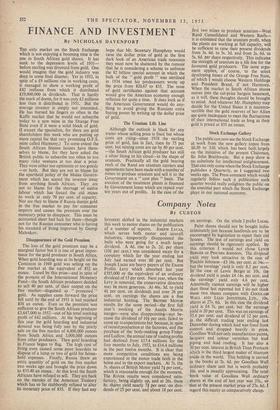Company Notes
By CUSTOS INTEREST shifted in the industrial markets this week to motor shares on the publication of a number of reports. JOSEPH LUCAS, which serves both motor and aircraft industries, temporarily disappointed the bulls who were going for a much larger dividend. A 4d. rise to 2s. 2d. per share OW per cent.) was considered mean for a company which for the year ending last July had earned over 60 per cent. But Joseph Lucas are heavy payers of the Excess Profits Levy which absorbed last year £585,000 or the equivalent of an ordinary dividend of 15 per cent. Next year, when the Levy is removed, the conservative directors may be more generous. At 46s. 3d. to yield 41 per cent, on dividends and over 26 per cent, on earnings the shares are a fine industrial holding. The BRITISH MOTOR results for the same period-the first full year's working of the Austin Morris merger-were also disappointing-not be- cause the dividend of 10/ per cent. failed to come up to expectations but because, in spite of record production at the factories, and the purchase of the body-making group Fisher and Ludlow, the annual rate of trading profits had declined from £17.4 millions for the four months to July, 1952, to £14.4 millions in the past twelve months. It is clear that more competitive conditions are being experienced in the motor trade both in the home and in the export markets. At 7s. the 5s. shares of British Motor yield 71 per cent., which is reasonable enough for the moment. The ROVER results were considered satis- factory, being slightly up, and at 26s. these 8s. shares yield nearly 71 per cent, on divi- dends of 25 per cent. and about 18 per cent. on earnings. On the whole I prefer Lucas.
Paint shares should not be bought indis- criminately just because landlords are to be encouraged by legislation to repair their old houses. The test of earnings and yield on earnings should. be rigorously applied. By this criterion I would not chose LEWIS BERGER or PINCHIN JOHNSON. The dividend yield may look attractive in the case of Pinchin Johnson-£5 16s. per cent. at 34s.- but the earnings' yield is only 8.2 per cent. In the case of Lewis Berger at 10s. the dividend yield is under £4 14s. per cent, and the earnings' yield only 4.6 per cent. Admittedly current earnings will be higher than those last reported but I' do not think these two shares compare with GOODLASS WALL AND LEAD INDUSTRIES, LTD., 10s. shares at 27s. 6d. In this case the dividend yield is £4 7s. per cent, but the earnings yield is 20 per cent. This was on earnings of 55.6 per cent, and dividend of 12 per cent. in the difficult trading year ending last December during which lead was freed from control and dropped heavily in price. Goodlass Wall not only manufactures paints, lacquers and colour varnishes but lead piping and lead roofing. It has also a 30 per cent. interest in British Titan Products which is the third largest maker of titanium oxide in the world. This holding is carried in the books at 2s. 6d. per Goodlass Wall ordinary share unit but is worth probably 10s. and is steadily appreciating. The total book value of Goodlass Wall ordinary shares at the end of last year was 37s., so that at the present market price of 27s. 6d. I regard this equity as comparatively cheap.
































 Previous page
Previous page